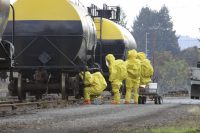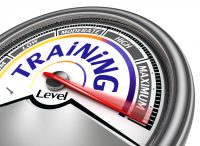Category: Training
Training is the number one element in accident, incident, and illness avoidance. Check the articles here frequently for the latest and best tips on techniques, trends, programs and equipment. We offer explanations for group, one-one, or self-directed situations, in both general and specific work activities. Your training will be both easier and more effective if you do.
While the Ebola threat seems to have been contained for the time being in the United States, it is still a problem in other parts of the world. In today’s Advisor, learn how training is helping fight this deadly disease. With the news that Sierra Leone’s vice president was put in quarantine this week after […]
Facilities that are required to develop a Facility Response Plan (FRP) must include a facility response training program with drills and a testing program, and document the program in the FRP. Draft PREP Changes The requirement to develop and implement a program of response drills and exercises, including evaluation procedures, can be met by implementing […]
Today’s Advisor reports a “good news” story about how effective training saves lives. When three miners became trapped in a lead zinc mine in January 2010 in Bunker, Missouri, rescue teams worked together to save them, applying what they had learned in training to a real-life test of their skills. The U.S. Department of Labor’s […]
Emergency responders must be trained before their participation in emergency response operations. Their training must be based on the functions and duties they will be expected to perform. Examples of activities emergency responders could be involved in include: Responding to the spill of a highly toxic substance from an overturned 55-gallon drum Responding to a […]
HAZWOPER applies to employers involved in three general categories of work operations: Hazardous waste site cleanup operations (e.g., Superfund, voluntary cleanups, and corrective actions under RCRA) Operations involving hazardous waste at TSDFs (e.g., a landfill that accepts hazardous waste), and Emergency response operations for releases of, or the threat of release of, hazardous substances at […]
The goal of training is always to develop employees—to work more safely, to be more productive, to act as a leader, and to be more professional. In today’s Advisor, we’ll look at how one company has made a commitment to developing its employees across the board. Allianz Life Insurance Company of North America has received […]
How can visualization help you prepare for—and increase your effectiveness in facilitating—classroom training? In today’s Advisor, we get valuable visualization techniques from an expert trainer. Even as a seasoned trainer and speaker, Eric Papp still uses visualization before training sessions and presentations. The night before a management seminar, for example, he gets permission to go […]
LifeCourse Associates has released Why Generations Matter, a research report that uncovers what each generation values in an employer and how well the needs of different generations of workers are—or are not—being met. Today’s Advisor reviews the findings and, in particular, what the generations want regarding training and technology. “This is the most comprehensive quantitative […]
When you think of RCRA, you think of manifests, “cradle to grave” hazardous waste management, transportation, container management, and endless hours of recordkeeping. However, one important aspect of RCRA for EHS managers is training. There are specific training requirements for personnel at hazardous waste TSDFs and large quantity generators (LQGs). Small quantity generators (SQGs) are […]
Step 1: Know Which Agency Rules Apply The U.S. Environmental Protection Agency (EPA), OSHA, and the U.S. Department of Transportation’s Pipeline and Hazardous Materials Safety Administration (PHMSA) each have separate training rules, but there is often overlap among the various training requirements. For example, an employer may have workers managing hazardous waste and have the […]










